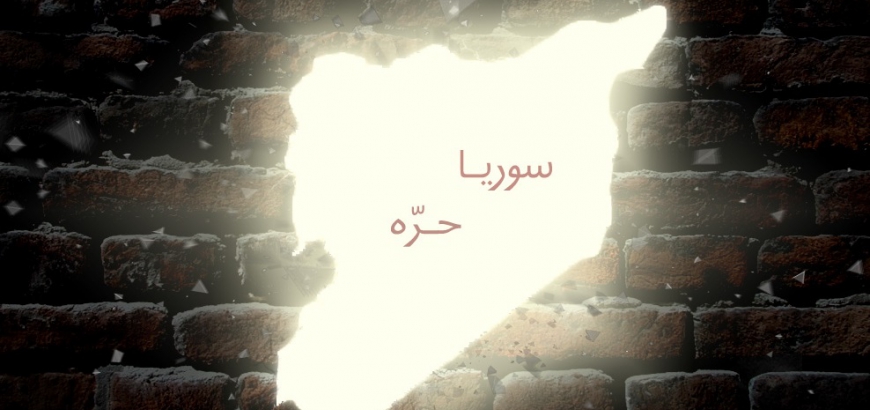After mounting rounds of undeclared dialogues in Berlin, figures and leaders from the ethnic, religious and sectarian communities of Syria arrived at an 11-item document, including the unity of Syria and “individual accountability,” reflecting the consensus of the central bloc of Syrian society. There is a hope that the document can be a supra-constitutional “social contract” for Syria’s future, distant from the formulas of the regime and the opposition.
Religious figures from the Alawite sect participated in the dialogues, as well as tribal leaders, and Christian, Druze and Kurdish leaders. Some meetings were held in Beirut and Turkey before the meetings in Berlin organized by an independent German institution. The process was carefully organized and ended with signing a document with witnesses in Berlin on Nov. 21. Among those who participated was Mulham al-Shabali, from the Al-Fawara tribe, and Sheikh Amir al-Dandal from the Al-Aqaidat tribe, as well as Aounein al-Jarba from the Shamar tribe, Mustafa Kayali from the National Bloc in Aleppo-Idleb, and Mahmoud Abul Huda al-Husseini, former head of the Directorate of Aleppo Awqaf (Ministry of Religious Endowments), and former Syrian Ambassador to Britain Sami al-Khaimi. Religious figures from the Alawite sect who came from Homs, Safita and the Syrian coast also participated.
Speaking to Asharq al-Awsat, one of the organizers said: “The importance of each figure was checked, with our understanding of the regime structure, as the figures who participated in the dialogues have meaning, influence and social legitimacy on the coast.” He asked not to have the names published for the safety of the participants, especially those from inside the country connected to religious, historical and social figures.
The organizers of the unannounced meetings between Syrian figures and commanders in Berlin meant to leak its contents with the approach of the Sochi conference on the 29th and 30th of this month, as well as the peace negotiations in Vienna on the 25th and 26th. The document, which Asharq al-Awsat obtained a copy of, stipulates 11 items under the title “Code of Conduct for Syrian Coexistence,” which are: “The unity of Syrian territory, openness and recognition, no dominating or dominated, no one free of sin on the basis of mutual reciprocity among parties to the conflict, and no one innocent of carrying out each according to his role and future.”
The fifth item stipulates “accountability not revenge, given that accountability for the violations is an essential issue in building a state free of revenge, marginalization and exclusion. However, ‘accountability’ is personal and an individual cannot be held responsible for the group, just as the group cannot be held responsible for the individual.” The sixth item states: “Recognition of the rights of every Syrian to compensation for the property that was destroyed and the return of what was stolen, including his right to return to his hometown or the place where he was displaced from since March 2011, taking into consideration the needs and priorities and maintaining the rights of those affected before this date, whatever the type and origin of this right.”
The document also included “follow-up to the humanitarian issue” related to “prisoners, captives, missing, and the families of victims, and wounded and disabled, as well as similar cases” before March 2011, stressing “recognition that Syrian society is by nature diverse in terms of ethnicity, religion, sect and tribe, and no one class can monopolize political, social, cultural, national, religious or doctrinal life in Syria.” The seventh item stressed the “non-politicization of Syrian society on an ethnic, religious or sectarian basis, without prejudice to the right of the individual to belong to an ethnicity, religion, sect or tribe.” The last two items address “collective Syrian heritage” and “equality among Syrians and protection of their freedoms.”
With regards to this, Kayali said that all the participants were influential social and religious leaders removed from the direct political binary of the regime and opposition. He told Asharq al-Awsat: “It is an initiative to save what can be saved and to restore the spirit of the founding fathers in the independence era.”
The fifth item, related to “accountability and not revenge,” is perhaps one of the main issues discussed among participants over signing the document at the end of November in Berlin, given that this city is a “symbol of construction and unity” before it was announced days ago in Rome, a “symbol of peace and coexistence.”
Kayali said: “The understanding is that responsibility is for each individual according to his role and position,” which was agreed by Mahmoud Abul Huda al-Husseini. He told Asharq al-Awsat: “There was negotiation over every word for a long period, and we agreed in writing to each, which reflects that each participant is aware of the meaning of each word in its context.” He added: “The fifth item was a basis for discussion because everyone is responsible for their actions,” in addition to a dispute around the sixth item related to “reparation,” because it was a reference to issues before 2011 and went back to the preceding decades. The understanding was “not to refer to the regime or the opposition,” according to one participant.
Sami al-Khaimi, who did not participate in all the sessions but signed the document in Berlin, said: “It is a social initiative to restore cohesion to the various communities of the Syrian people and a sort of reassurance for each Syrian that the citizen is the basis in future Syria.” A Western diplomat in Beirut did not rule out that the Syrian authorities or officials could be informed about the initiative by some figures inside the country. He said: “What is important is that there is no intention to derail this initiative, which officials in Damascus were informed about and was worded generally and accurately.”
This article was translated and edited by The Syrian Observer. Responsibility for the information and views set out in this article lies entirely with the author.


